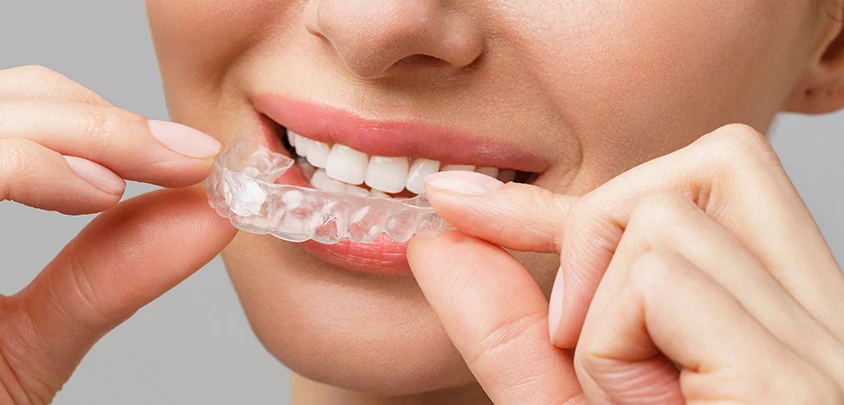Mouth Guards and Night Guards
What Are Mouth Guards and Night Guards?
Mouth guards are sometimes referred to as night guards. But they are two different types of appliances.
Mouth guards help cushion a blow or impact to the face, minimizing the risk of broken teeth and injury to your lips, tongue, jaw, or face. They typically cover the upper teeth protecting your smile and the soft tissues of your tongue, lips, and cheek lining.
Night guards are a protective mouth appliance worn while sleeping to help prevent teeth grinding and clenching, a habit known as bruxism. Again, this guard is usually worn on upper teeth but can be made to fit lower teeth. A grinding habit can be very destructive to teeth causing wear, fracture, chipping, and pain.

When Should a Mouthguard Be Worn?
Mouthguards are an important piece of protective gear for athletes of all ages and abilities. They should be worn for collision and contact sports starting at an early age. Mouth guards help protect against chipped or broken teeth, root and bone damage, and tooth loss. In addition to protecting teeth, mouth guards have proven effective in preventing serious injuries like jaw fractures, temporomandibular joint trauma, neck injuries, and concussions.

Are There Different Types of Mouthguards?
Custom Mouthguard: this is the most effective option as it is custom-made to fit your upper teeth and gums. This guard is made by a dental professional and offers the best protection while being the most comfortable mouthguard.
01
Over-the-Counter Boil and Bite: this mouth guard can be purchased at sporting goods stores and drugstores. They are first softened in water (boiled), then inserted and shaped to adapt/mold to your mouth. It is important to closely follow the manufacturers’ instructions.
02
Stock Mouthguard: this guard comes pre-formed and ready to wear. Many times, these guards do not fit as well as the other types. Sometimes these mouth guards can be bulky which can make breathing and talking more difficult.
03
When Is a Night Guard Necessary?
During a dental exam, your dentist may notice signs of clenching and grinding (bruxism habit) on your teeth. These signs present as worn teeth, chipping edges, and even fractured teeth. Another sign of bruxism is when patients have pain in their face or teeth when they wake up in the morning. When a dentist sees and hears these key findings, a night guard will be recommended. A night guard is worn to protect the upper and lower teeth from wearing against each other. The guard will also spread the bite forces helping to make a bruxism habit less painful

Are There Different Types of Nightguards?
Custom Night guard: the most effective and comfortable night guard. Your dentist will take an impression to fabricate a custom-made guard. Night guards can be made to fit over your upper or lower teeth. Patients tend to prefer this appliance due to its maximum comfort compared to preformed ones.
01
Over-the-Counter Boil and Bite Night guard: this sleep guard can be purchased at drugstores or online. It is similar to the mouth guard “boil and bite” process where the material is softened and then adapted to fit over the teeth.
02
Stock Night guard: this is a pre-formed sleep guard. This night guard does not conform to your teeth, it usually just rests between the back teeth to prevent teeth from touching. Patients tend to have mixed reviews about this type of appliance, but it can be an acceptable option.
03
